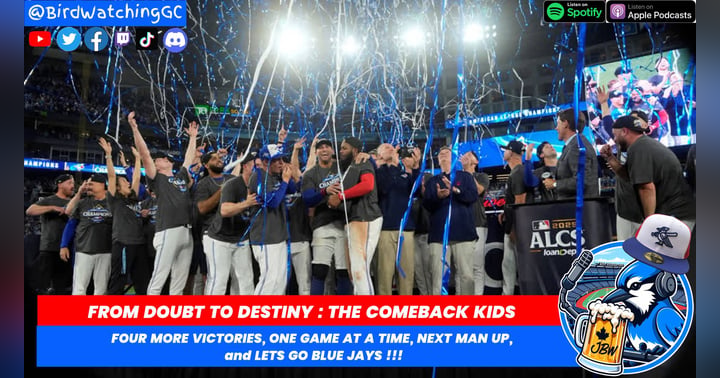Travis Snider Is Helping the Next Generation Win the Mental Game

Travis Snider once roamed the outfield for the Toronto Blue Jays at Sky Dome, hailed as a top prospect with a big bat and even bigger expectations. But today, he’s making his biggest impact off the field—guiding the next generation of athletes through the mental and emotional grind of competitive sports.
Now the CEO of 3A Athletics, Snider sat down with Jay Bird Watching Podcast to discuss his powerful journey from Major Leaguer to mental health advocate, sharing how he's helping young athletes, their parents, and coaches approach sports with a deeper sense of purpose and emotional awareness.
For the full podcast episode, please go to and subscribe for future updates. Audio can be found on any site you receive your podcast pleasures from as well.
More Than the Numbers: Snider’s Message to Young Athletes
Snider knows firsthand how chasing numbers—home runs, batting average, or prospect rankings—can distort an athlete’s self-worth. During the interview, he opened up about tying his identity to on-field performance, and how that narrow mindset haunted him through the highs and lows of his MLB journey.
“The hardest thing is being a kid who builds their whole sense of value around stats,” Snider said. “But your worth isn’t in your numbers—it’s in how you show up, grow, and respond to adversity.”
He encourages young players to resist turning baseball into their identity. Instead, they should embrace it as a vehicle for learning life skills—resilience, focus, leadership—that will outlast their playing days. This emphasis on growth as a person, being mentally prepared, and working with your teammates is at the core of what Snider believes grows great athletes. You can see this in the focus of his work at 3A Athletics.
Journaling for Growth: A Game-Changer for Emotional Intelligence
During our interview, Travis discussed a tool that he discovered through out the process of his career: journaling.
Through this he was able to organize his thoughts and have somewhere to collect them. This practice helped him get on point and be honest with himself as he worked through the highs and lows of being a big league baseball player.
His youth-focused journal isn’t about recording box scores—it’s designed to help athletes reflect on mindset, identity, confidence, and emotional triggers. With pages tailored to both conscious and subconscious growth, young players can explore how frustration, pressure, and even self-talk impact their ability to perform and enjoy the game.
“Athletes often don’t realize how much a bad BP session can sabotage a game. But through journaling, you start seeing patterns,” he said. “Then you learn to respond—not just react.”
For Snider, journaling became a big part in his gateway to mental clarity late in his career, especially after confronting deeper emotional challenges. It’s now a cornerstone of what he teaches through his company.
Coaching the Parents, Too: Building Better Sideline Support
Snider emphasized that athlete development isn’t just a kid’s journey—it’s a family one. He highlighted the importance of helping parents recognize how their own sports experiences and reactions shape their child’s self-talk.
“Your voice as a parent becomes their inner critic—or their inner coach,” he said. “We have to model the emotional control and curiosity we want them to show.”
3A Athletics offers parent-specific guidebooks that tackle the infamous “car ride home,” expectations around youth stardom, and how to support young athletes without overwhelming them with judgment.
He challenges parents to ask themselves: How did your parents show up in your sports journey? How much of that are you repeating?
3A Athletics: A New Model for Sports Mentorship
Through 3A Athletics, Snider is building a modern approach to athlete development—one where mental health, emotional growth, and healthy relationships are as important as drills and reps.
The company offers:
📘 Athlete Journals for self-reflection and goal-setting
🤝 Parent and Coach Guidebooks to reshape sideline interactions
🗣️ Workshops and Seminars to deepen communication within teams and families
At its heart, the mission is simple: help kids become better athletes by first helping them become more self-aware, confident human beings. If you have a young athlete the work Travis and his team have been doing could be key to seeing the big picture. Make sure you check it out here right here. https://www.3athletics.com/
Final Thoughts: The Comeback Is Emotional, Not Just Physical
Snider’s baseball story is one of ups and downs—not from physical injury or stat slumps, but from the internal battles many athletes never talk about. And now, he's using that journey to give others the tools he wishes he had earlier in his career. We loved talking with Travis on this topic and we can not wait to have him back for more stories. He is a true fun character in athletics and someone that is super genuine. His message is a clear one and he truly wants the best for youngsters as they progress in sports.
“We all tell kids to grind—but what if we taught them to grow?”
That’s the question Snider and 3A Athletics are answering, one journal, one conversation, and one breakthrough at a time.
Thank you for the chat Travis and keep up the great work!










